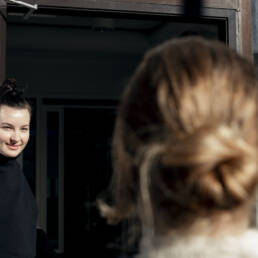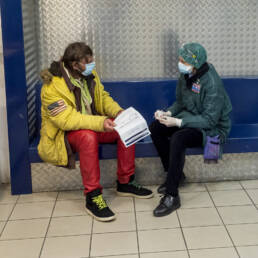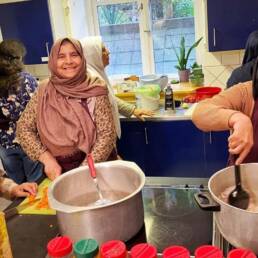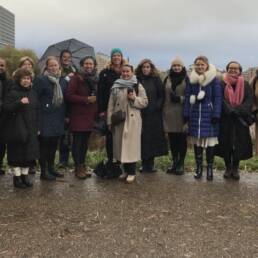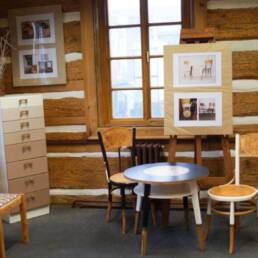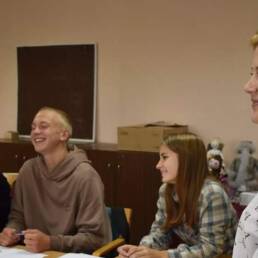Author
Odarka Bordun
Communication Manager
Caritas Ukraine
Three Caritas soup kitchens in three remote regions of Ukraine provide at least one hot meal a day to people in need in Nadvirna, Melitopol and Poltava.
Beyond food, Caritas social support also focuses on professional training, children’s education, good nutrition, and much more.
Most of our beneficiaries eat only once a day. Without us, they might not have starved to death, but we are very supportive and helpful to them.
Fr. Andriy Budzak, Director of Caritas Nadvirna (Ivano-Frankivsk region)

A local Caritas soup kitchen has been operating since 2016 and served up to 100,000 hot lunches for the needy. It was Caritas Nadvirna’s first project, which was later followed by the social wardrobe – a mutual aid group for families with children with disabilities. The social wardrobe provides classes for children supported by a psychologist and an English teacher, as well as a laundry and a charity cafe that serves coffee and baked croissants. ‘This is what Christ taught us: the first good deed is to feed the hungry, as a hungry person cannot think about clothes, living conditions, family, work or development, he thinks only about food,’ Fr. Andriy explains. Up to 40 people a day come to the Caritas soup kitchen – the homeless, people with addictions, single elderly people and people with disabilities. Some lunches are delivered by volunteers to the homes of needy people. Some visitors feel ashamed of their situation, but for many these dinners are the only attention they receive and provide much hope.
The work of the soup kitchen is supported by local entrepreneurs and committed private donors. Caritas has become a kind of ‘mediator’ between those who need help and those who are willing to provide help. Father Andriy is sure that every Caritas centre needs to have such a soup kitchen: ‘It may seem that this is not the most important thing, but it is not so, there always will be those who need it,’ he added.

Officially, only one person is working in Caritas Melitopol (Zaporizhzhia region) – a young priest, Fr. Vladyslav Ignatiuk. But in practice, he works with a big team of volunteers who also help to run the soup kitchen which feeds up to 40 people in winter, mostly the homeless, addicts, and single mothers. According to the Director, there is practically no social infrastructure in the city: there is no shelter for the homeless, no palliative care facility, no centre for people with disabilities. People live at risk of poverty, barely survive, and have nothing to eat. It became clear that just providing food is not enough, that is why the peer support group for people with addictions was introduced. 20 members of the group underwent rehabilitation, which is key to reintroducing them back into society. It gave the possibility for beneficiaries of Caritas Melitopol to learn the basics of carpentry and metalworking in local companies. All this allowed them to become full members of the community and to settle in new living conditions.
Father Vladyslav says that the Soviet ‘heritage’, which is still important in the region, as well as the tough economic situation forced people to care only for themselves, not participating in community building and care for the common good. Volunteering, willingness to help, generosity and sharing are perceived in the local community as something incredible. ‘Through our ministry, we try to remind people that every person is a social person – intended to interact with others, to live for others, to convey that we live not in the “dog-eat-dog world” but we all are brothers and sisters, we believe that our experience will motivate others,’ he said.
Caritas Poltava has a specially equipped kitchen where children and young people from families in difficult circumstances, as well as young people with disabilities, learn to cook. They also are making charity dinners for the organisation’s beneficiaries, which are distributed to needy people. Youth are often involved in baking and making a variety of delicacies.
‘Despite our expectation that the main visitors to the soup kitchen would be homeless people, we often see lonely elderly people, who barely have enough money from meager pensions to pay for utilities and purchase medicines. We are also visited by military veterans, internally displaced people, and people with disabilities,’ Alla Rakovetska, the local Caritas project manager says. ‘These dinners, first of all, are expressions of our love and attention, and only then food,’ she continues. ‘When you come to the distribution point, you understand that people want to communicate, they want to complain, to talk about something personal, they want to be heard and understood. Often people receive other assistance in addition to the food: warm clothes or advice.’
According to Caritas, the soup kitchen is very actively supported by the city community, only a few projects receive such a positive response. Even students, who are considered to be always hungry, bring food to share with visitors to the canteen. Elderly people bring canned or home-grown vegetables. Assistance is also provided by local entrepreneurs and companies. The work of the soup kitchen in Poltava is a great example of what we can do together – because to feed the hungry is one of the easiest things we can do for people around us.
This article is part of the Caritas Internationalis Together We campaign.



